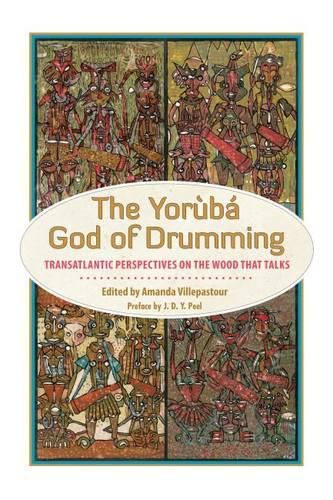Readings Newsletter
Become a Readings Member to make your shopping experience even easier.
Sign in or sign up for free!
You’re not far away from qualifying for FREE standard shipping within Australia
You’ve qualified for FREE standard shipping within Australia
The cart is loading…






This title is printed to order. This book may have been self-published. If so, we cannot guarantee the quality of the content. In the main most books will have gone through the editing process however some may not. We therefore suggest that you be aware of this before ordering this book. If in doubt check either the author or publisher’s details as we are unable to accept any returns unless they are faulty. Please contact us if you have any questions.
As one of the salient forces in the ritual life of those who worship the pre-Christian and Muslim deities called orishas, the Yoruba god of drumming, known as Ayan in Africa and Ana in Cuba, is variously described as the orisha of drumming, the spirit of the wood, or the more obscure Yoruba praise name AsoroIgi (Wood That Talks). With the growing global importance of orisha religion and music, the consequence of this deity’s power for devotees continually reveals itself in new constellations of meaning as a sacred drum of Nigeria and Cuba finds new diasporas.
Despite the growing volume of literature about the orishas, surprisingly little has been published about the ubiquitous Yoruba music spirit. Yet wherever one hears drumming for the orishas, Ayan or Ana is nearby. This groundbreaking collection addresses the gap in the research with contributions from a cross-section of prestigious musicians, scholars, and priests from Nigeria, the Americas, and Europe who have dedicated themselves to studying Yoruba sacred drums and the god sealed within. As well as offering multidisciplinary scholarly insights from transatlantic researchers, the volume includes compelling first-hand accounts from drummer-priests who were themselves history-makers in Nigerian and Cuban diasporas in the United States, Venezuela, and Brazil. This collaboration between diverse scholars and practitioners constitutes an innovative approach, where differing registers of knowledge converge to portray the many faces and voices of a single god.
$9.00 standard shipping within Australia
FREE standard shipping within Australia for orders over $100.00
Express & International shipping calculated at checkout
This title is printed to order. This book may have been self-published. If so, we cannot guarantee the quality of the content. In the main most books will have gone through the editing process however some may not. We therefore suggest that you be aware of this before ordering this book. If in doubt check either the author or publisher’s details as we are unable to accept any returns unless they are faulty. Please contact us if you have any questions.
As one of the salient forces in the ritual life of those who worship the pre-Christian and Muslim deities called orishas, the Yoruba god of drumming, known as Ayan in Africa and Ana in Cuba, is variously described as the orisha of drumming, the spirit of the wood, or the more obscure Yoruba praise name AsoroIgi (Wood That Talks). With the growing global importance of orisha religion and music, the consequence of this deity’s power for devotees continually reveals itself in new constellations of meaning as a sacred drum of Nigeria and Cuba finds new diasporas.
Despite the growing volume of literature about the orishas, surprisingly little has been published about the ubiquitous Yoruba music spirit. Yet wherever one hears drumming for the orishas, Ayan or Ana is nearby. This groundbreaking collection addresses the gap in the research with contributions from a cross-section of prestigious musicians, scholars, and priests from Nigeria, the Americas, and Europe who have dedicated themselves to studying Yoruba sacred drums and the god sealed within. As well as offering multidisciplinary scholarly insights from transatlantic researchers, the volume includes compelling first-hand accounts from drummer-priests who were themselves history-makers in Nigerian and Cuban diasporas in the United States, Venezuela, and Brazil. This collaboration between diverse scholars and practitioners constitutes an innovative approach, where differing registers of knowledge converge to portray the many faces and voices of a single god.